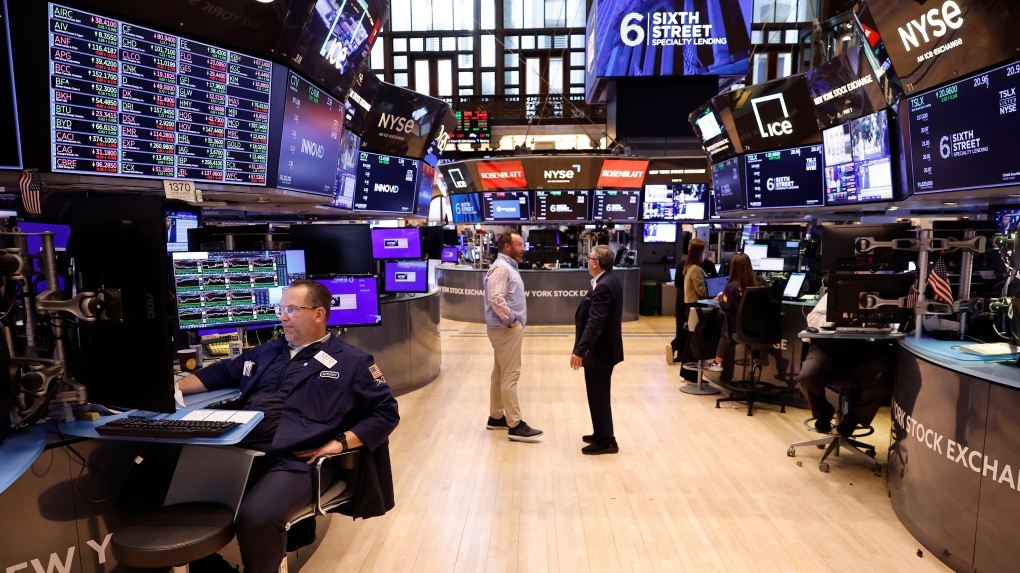Latest News
- Big immigration shock: Nova Scotia changes its rules
- Alarming increase in human trafficking in Canada
- Calgary's third consecutive success in receiving the Bird-Friendly City title
- Plane crashes near Nanaimo; police say no survivors found
- Old Toronto film equipment store ready to be sold after 40 years
Latest Ads
-
Jasmine Jewel
Call
-
Omidan group
Call
-
Amir Madanpour
Call
-
Dimo studio
Call
-
Yorkacademy
Call
-
Maryambagheri
Call
-
Shishlix Restaurant
Call

Has the AI bubble burst? Wall Street wonders if artificial intelligence will ever make money
In the season of tech company earnings reports, one big question is on the minds of Wall Street investors: When will anyone make real money from artificial intelligence?
Since ChatGPT started the artificial intelligence arms race 18 months ago, tech giants have promised that the technology would revolutionize every industry and used it as justification for investing tens of billions of dollars in data centers and semiconductors. However, the products delivered so far, such as chatbots, cost savings using artificial intelligence, and AI-powered search that sometimes provide false results, fall far short of these promises.
But big investments by big tech companies have so far not led to significant increases in AI revenue or profitable new products, and investors are starting to worry.
Heavy costs and investors' worries
Poor financial results from Amazon and Intel fueled concerns. Amazon's stock fell nearly 9 percent as investors worried about the company's heavy spending on artificial intelligence without significant returns. Intel also suffered a 25% drop in shares and announced that it plans to save $10 billion to cut costs and lay off the workforce.
Investors are concerned about whether these big investments in AI are worthwhile or just another bubble in the tech industry. "Right now, there's a debate in the industry about the capex requirements for productive AI and whether monetization will actually match that," Morgan Stanley analyst Keith Weiss said on Microsoft's earnings call.
UBS analyst Steven Jo asked Google CEO Sundar Pichai how long it would take for AI to "help generate revenue ... and create more value over time, as opposed to cost savings."
A Goldman Sachs report last week also questioned whether there is "too much cost and too little benefit" in artificial intelligence.
More investments, more worries
Shares of both Google and Microsoft fell after earnings reports that showed investor dissatisfaction that their big investments in artificial intelligence did not lead to much better results than expected. Meta, which faced similar disappointment from shareholders last quarter, avoided a similar fate this time by showing that its AI investments are at least helping its core business.
Some investors even expected that this quarter, the three tech giants will start to reduce their AI infrastructure investments because "AI is not delivering the returns they expected." Conversely, Google, Microsoft and Meta have all announced plans to spend more as they prepare the ground for what they hope will be an AI-driven future.
Tech leaders have said they need more time. Microsoft CFO Amy Hood said on the company's earnings call that its data center investments are expected to help monetize its AI technology for "the next 15 years and beyond."
Suzanne Lee, Meta's CFO, said she expects "productive AI returns to come over a longer period of time." He added: "Generative AI is where we are very early ... We do not expect our generative AI products to be a significant revenue driver in 2024, but we do expect them to create new revenue opportunities over time that will give us It allows us to get a solid return on our investment.”
This time horizon is uncomfortable for many investors who are used to reliable, quarter-to-quarter sales and profit growth from Silicon Valley.
"If you're going to invest now and get a return in 10 to 15 years, that's a venture investment, not an investment in a public company," Luria said. For public companies, we expect returns on investment over much shorter time frames. "So that's frustrating because we're not seeing the kind of programs and revenue from programs that we need to justify any investment right now."
Some investors also question whether AI investments will pay off. Goldman Sachs analyst Jim Covelo argued in a report last week that "the technology is not designed to solve complex problems that justify the costs."
As an example of how long it takes for artificial intelligence products to come to fruition, we can mention Tesla's "full self-driving" technology. Tesla has been selling the driver-assistance technology as key to its company's business plan since 2015, and has consistently promised it will be fully capable soon. But the FSD still requires an attentive human driver to take over the wheel in the event of a problem, and nearly four years after it was first introduced to Tesla customers, it regularly faces safety concerns.
Right now, tech CEOs agree that "the risk of underinvestment is far greater than the risk of overinvestment," as Google CEO Pichai said on last week's earnings call (Meta CEO Mark Zuckerberg also spoke during his company's call repeated a similar line). Building data centers takes time, and if anyone is going to win the AI race, no company wants to blow its chance at coming out on top because it doesn't have enough computing power.
Suggested Content
Latest Blog
Login first to rate.
Express your opinion
Login first to submit a comment.
No comments yet.


































